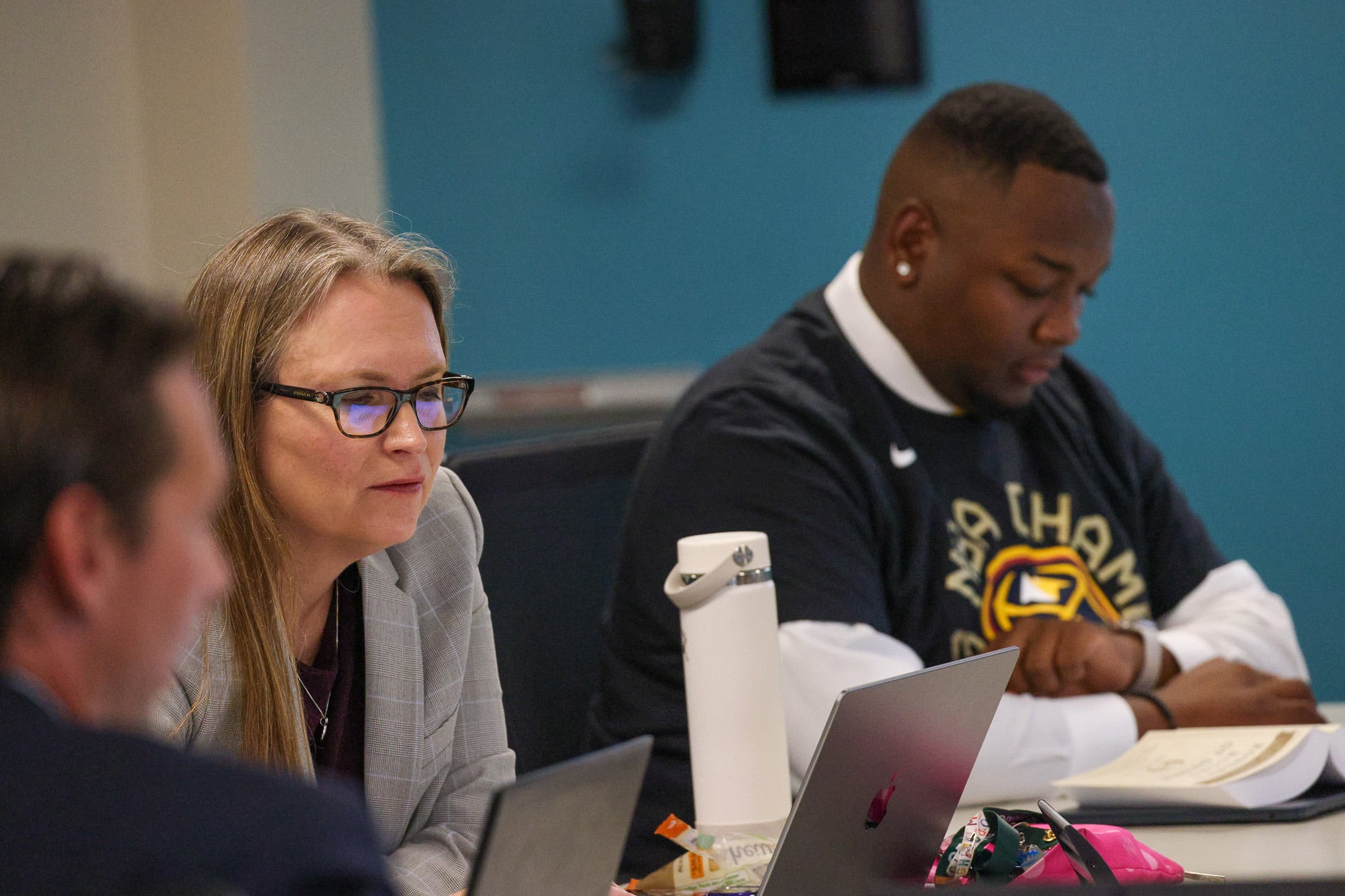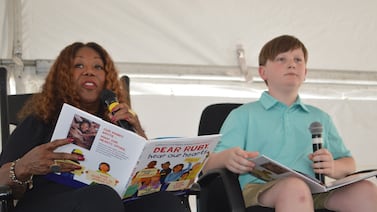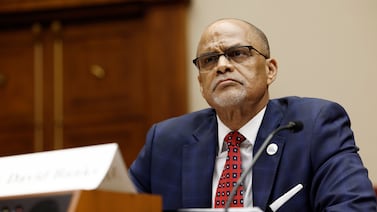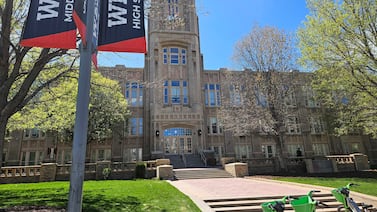Police officers will return to Denver schools next year, after the school board voted 4 to 3 Thursday to allow “the persistent presence of school resource officers” at schools.
The new policy reverses a 2020 board decision to remove SROs from Denver schools and puts to rest — at least for now — a debate that has raged in the community for nearly three months.
The split vote came after nearly four hours of debate, several amendments to the proposal, and accusations that some board members intentionally delayed the vote.
Board President Xóchitl “Sochi” Gaytán and members Scott Baldermann, Charmaine Lindsay, and Carrie Olson voted in favor of bringing police back to schools.
“This is about deterrence,” said Baldermann, who authored the proposal. “If it stops one kid from bringing a loaded gun into a school, I think it’s worth it.”
Board Vice President Auon’tai Anderson and members Scott Esserman and Michelle Quattlebaum voted no. The three board members had backed an alternate proposal that would have established a group of “community resource officers” that would have responded to schools when necessary but would not have been stationed inside them.
Anderson said returning SROs was going “back to an oppressive system.”
“The police system in America is designed to oppress,” Esserman said.
The much-anticipated decision comes after a particularly violent school year. A shooting inside East High School in March, in which a student shot and injured two deans and later took his own life, most forcefully reignited the debate about police in schools.
The new policy doesn’t specify which schools will have SROs. It simply directs the superintendent to establish a memorandum of understanding with the Denver Police Department for when SROs are necessary at district-run and charter schools.
However, it does allow the superintendent to “promptly remove” SROs who don’t follow district policy and best practices. It also requires the district to monitor the number of times SROs ticket or arrest students to ensure marginalized students aren’t disproportionately targeted.
Denver Police Chief Ron Thomas has said that his preference is to have school resource officers in high schools but that he will work within the parameters established by the district.
A majority of board members removed other guardrails that Baldermann had included in the proposal, including that SROs not be involved in student discipline, not store firearms at schools, and that the officers “reflect the students at the school” demographically.
Baldermann said he included those limits to prevent disproportionate policing of students of color — something opponents of police in schools say is nearly inevitable.
But Anderson, Esserman, and Quattlebaum criticized those guardrails as getting too deep into operational details. Olson said she preferred the simplified policy.
The Denver school board uses a governance model that calls for board members to set policy and leaves the superintendent responsible for operations. Criticizing an idea as too operational has become a way for board members to reject ideas they oppose.
Over the course of the meeting, Anderson and Esserman proposed numerous amendments that would place fewer limits on how police operate in schools — the opposite of the position they have advocated for. Other board members accused them of purposely extending the debate.
“To me, this feels more like a delay to not vote on the original motion,” Gaytán said after Esserman offered one of his amendments.
Esserman disputed that he was trying to delay. “This is about getting it right,” he said.
Lindsay also expressed frustration about delays. “So all I have to do is make a motion in the middle of a motion and I can stifle everybody else’s speech?” she said.
“If you get a second,” Anderson said.
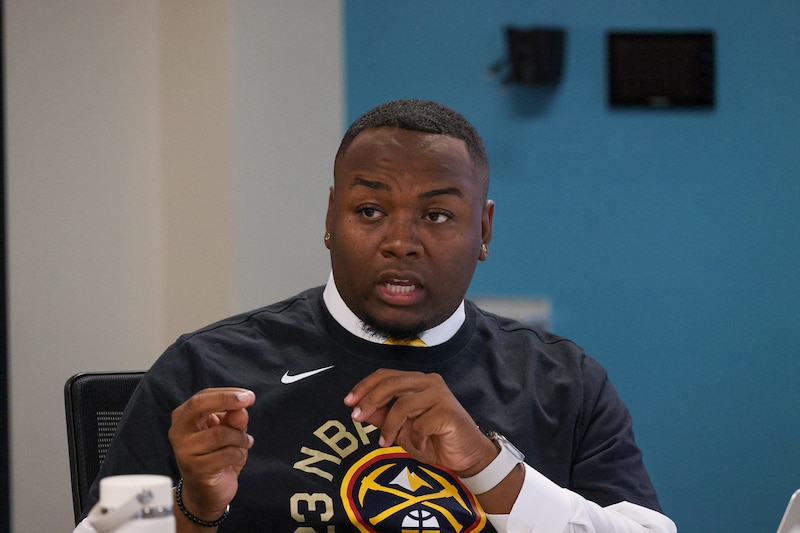
A previous board voted three years ago, in June 2020, to remove school resource officers from Denver schools. At the time, 18 SROs were stationed in middle and high schools across the district. Denver Public Schools and the Denver Police Department split the cost.
But amid protests against racist policing following the murder of George Floyd in Minneapolis, the Denver school board unanimously decided to sever ties with the police department. Anderson, Baldermann, and Olson were on the board at the time and voted in favor.
After SROs were removed, the number of DPS students ticketed and arrested at school went down. But the number of real and fake guns confiscated at schools went up. And several high-profile shootings in and around East High sparked community concern.
A day after the shooting inside East in March, the school board temporarily lifted its ban on SROs. For the last two months of school, 14 SROs were stationed on 13 high school campuses.
The temporary suspension was set to expire June 30. That’s also the deadline the board gave Superintendent Alex Marrero to come up with a long-term safety plan for the district.
Public opinion on whether to reinstate SROs varied widely. In an April survey conducted by DPS, 33% of staff, 41% of students, and 48% of parents who responded said SROs would help.
At a raucous school board meeting last week, Deputy Superintendent Tony Smith said more recent surveys showed more support for SROs. But the feedback from a series of telephone town hall meetings in May was that parents consistently ranked SROs second behind weapons detection systems as the resource they wanted DPS to invest more money in.
The advocacy group Movimiento Poder has strongly opposed reintroducing SROs. The Denver-based organization has pushed for years to disrupt the school-to-prison pipeline. In a press release after the vote, Executive Director Elsa Bañuelos-Lindsay condemned the decision as “a false solution that will directly endanger students.”
“It will mean plunging students back into the harm and criminalization that cops are known to bring to classrooms and especially students of color, while not providing protection to students,” she said.
Melanie Asmar is a senior reporter for Chalkbeat Colorado, covering Denver Public Schools. Contact Melanie at masmar@chalkbeat.org.


